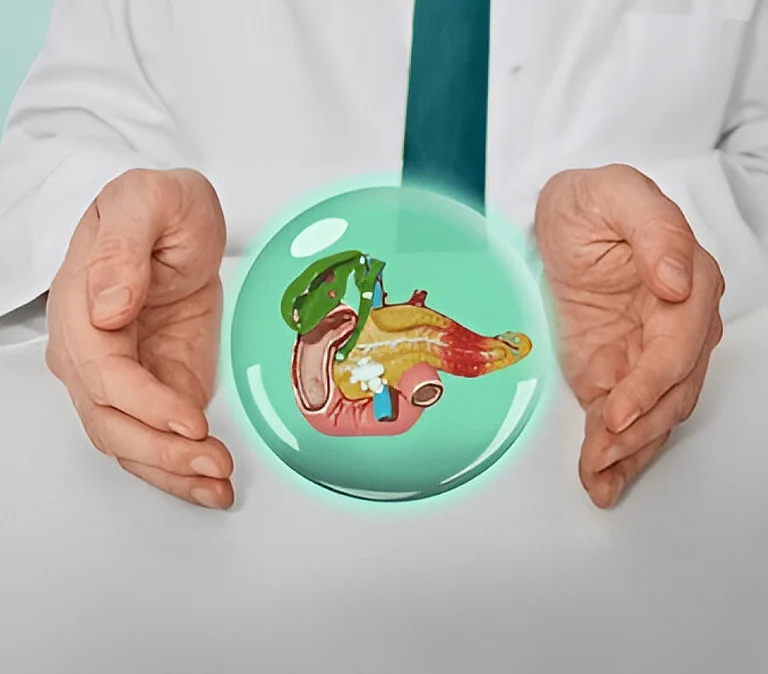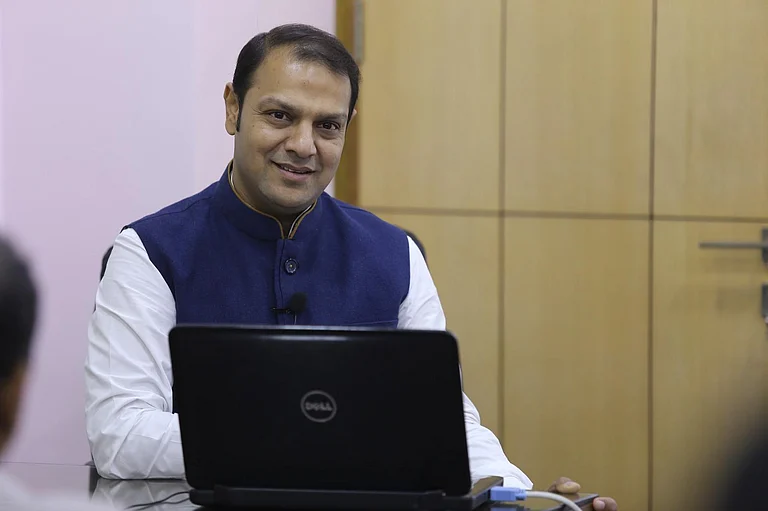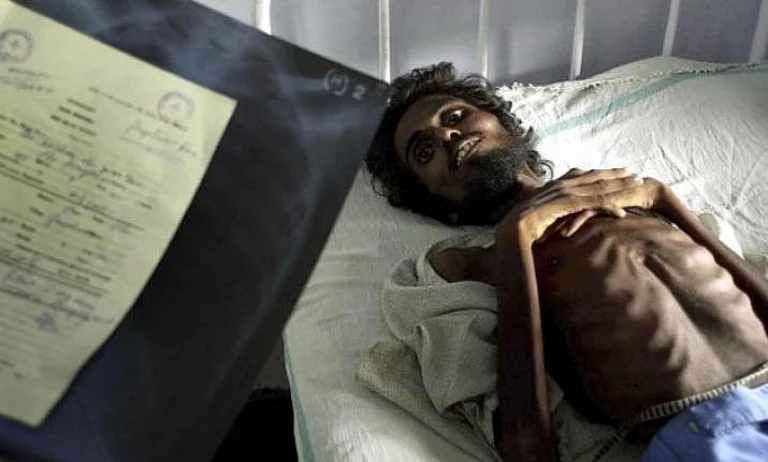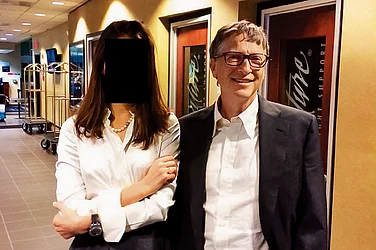A top Chinese scientist has said that Covid-19 could have leaked from a leak and that lab-leak theory should not be dismissed.
The major comment comes after over three years of the beginning of the Covid-19 pandemic in China's Wuhan city, home to the Wuhan Institute of Virology (WIV), which is the world leader in coronavirus research.
Though the Chinese government and some of the world's top scientists maintained that SARS-CoV-2, the virus causing Covid-19 disease, had natural origin, likely in a bat, no evidence of the same has surfaced so far. On the contrary, as Outlook reported earlier, it's now known that the same scientists who pointed to a natural-origin of Covid-19 were actually rattled by some features of the virus that suggested bio-engineering.
As a series of investigative reports and US Congressional investigations revealed the details and extent of Chinese coronavirus research, several leading experts now say there is a strong circumstantial case for a lab-origin of Covid-19.
In this context, Chinese scientist George Gao's comment acknowledging the potential lab-origin of Covid-19 acquires significance. Gao is the former head of Chinese Center for Disease Control and Prevention (CDC).
Here we explain what Gao said and what we know so far of the origin of Covid-19.
Whad did George Gao say?
Former Chinese CDC chief George Gao said that Covid-19 could have leaked from a leak and that lab-leak theory should not be dismissed.
In a conversation with BBC News, Gao said, "You can always suspect anything. That's science. Don't rule out anything."
As the CDC chief, Gao played a leading role in the initial response to the Covid-19 pandemic in China.
Though the Chinese government has so far outright rejected the possibility of a lab leak, Gao's comments suggest that the government did consider the possibility and looked into it.
"The government organised something [an investigation into WIV]...That lab was double-checked by the experts in the field," said Gao, but added that the WIV was given a clean-chit as per what he heard.
Gao added, "I think their conclusion is that they are following all the protocols. They haven't found [any] wrongdoing."
About Gao's comments, the BBC notes, "On the surface, Prof Gao's comments about not ruling out a lab leak appear seriously at odds with China's publicly stated position. Risky even."
However, the BBC noted that Gao's comments could be in line with a theory that the Chinese government has been pushing. This theory, a third theory besides the natural- and lab-origin, says that the virus could have entered China from abroad via frozen food imports.
In its propaganda, the Chinese government has been pushing a strange, unsubstantiated third theory of its own.
The BBC notes, "The virus, it says, didn't come from the lab or the market but may have been brought into the country on frozen food packaging. The Chinese government says it rules out both the lab and the market - and Prof Gao's comments could simply be seen as the more scientific version of that position, because he rules out neither. Both are based on that idea of a lack of evidence."
Taking lab-leak theory seriously
The possibility of Covid-19 originating in a lab was dismissed for much of 2020 and was termed as 'conspiracy theory'.
However, a series of investigative reports and dogged pursuit by open-source investigators made the theory subject to mainstream discussions in 2021.
Then, by 2022, the US Congressional investigations into Covid-origin took steam and, coupled with investigative reporting and open-source investigations, details of Chinese risk coronavirus research and collaboration of Chinese scientists with US researchers started getting public.
Emails of top US experts obtained either through US Freedom of Information Act (FOIA) or Congressional subpoenas also revealed that the same scientists who dismissed the lab-theory publicly were rattled by some features of the virus privately and were privately discussing potential lab-origin.
All of this built a strong circumstantial case for the lab-origin of the Covid-19 pandemic.
To be sure, no one is saying that Covid-19 originated in a lab. There is no hard proof of that. But several top experts are saying that there is a strong chance it did and the possibility is worth investigating and should not be dismissed.
In February 2020, the WHO in a report said that Covid-19 is a zoonotic virus and bats appear to be the source.
"Covid-19 is a zoonotic virus...Bats appear to be the reservoir of the Covid-19 virus, but the intermediate host(s) has not yet been identified. However, three important areas of work are already underway in China to inform our understanding of the zoonotic origin of this outbreak," said the WHO report.
However, there was no evidence of the same then and there is no evidence of the same now.
Outlook earlier noted, "For most of 2020, the question of the origin of the Covid-19 was fairly settled. The mainstream consensus was that SARS-CoV-2, the virus causing Covid-19, had jumped from animals into humans, and anyone saying otherwise was a conspiracy theorist. However, the conclusive evidence for the consensus then and now is the same — zilch."
A top paper published in 2020 dismissed the lab-origin of Covid-19 but later unearthed emails showed that the scientists privately discussed the lab-origin. Two of the authors initially noted that the virus structure suggested engineering.
Earlier this year, the US Congressional investigators revealed that Edward Holmes of Marie Bashir Institute for Infectious Diseases and Biosecurity at University of Sydney found the virus "pre-adapted" to infect humans.
Outlook earlier noted, "In the most damning finding, the memo revealed that one of this paper’s authors —Holmes— actually found the virus 'pre-adapted for human spread', a finding also made by molecular biologist and author Alina Chan but was dismissed by a large section of the scientists."
In May 2020, Alina and her colleagues published a study that noted that SARS-CoV-2 appeared to be pre-adapted to infect humans. The study noted that even the possibility that a "non-genetically-engineered' precursor could have adapted to humans while being studied in a laboratory should be considered". Holmes and fellow top scientists had the same thoughts but they said the exact opposite in public.
In another set of emails, it was revealed that Anderson found the virus to show "engineered" features.
Anderson noted, "The unusual features of the virus make up a really small part of the genome (<0.1%) so one has to look really closely at all the sequences to see that some of the features (potentially) look engineered. I should mention that after discussions earlier today, Eddie, Bob, Mike and myself all find the genome inconsistent with expectations from evolutionary theory. But we have to look at this much more closely and there are still further analyses to be done, so those opinions could still change."
What do we know of the Covid-origin?
The short answer is that we do not know for sure.
The longer answer is that while there is little evidence to point to a natural-origin, whereas some experts say that the evidence so far builds a strong circumstancial case for a lab-origin.
"Yes, I do lean towards the lab-origin now because of the Defuse proposal, which is also described in the book VIRAL: The Search for the Origin of Covid-19. The burden of proof is on the people who claim they know how the pandemic started. We should be focused on gathering evidence instead of trying to close the case without a proper investigation," said Alina, Scientific Advisor at the Broad Institute of MIT and Harvard, in an interview with Outlook.
At the centre of this is gain of function (GoF) research, which is basically any research that gives new properties to an organism —such as a virus— that it does not naturally have. Lately, it has come to be associated with scientific activities where organisms’ transmissibility or virality is enhanced in a lab. The WIV is a global hub for coronavirus GoF research.
The idea behind GoF research, say its supporters, is that it would help prevent the next pandemic. But it did not prevent the Covid-19 pandemic and did not play any role in the development of vaccines or drugs. The relevance of GoF research is now under question.
"The risks are far greater than the potential benefits, as I have shown in my research. Much of GoF is conducted under the premise of ‘preventing a pandemic’ but how does seeking out remote animal viruses, far from human habitation, and bringing them into labs to study them and do GoF on them help? To date such research has failed to provide tangible benefits, but the risks are substantial," said Raina MacIntyre, NHMRC Principal Research Fellow and Professor of Global Biosecurity at University of New South Wales (UNSW), Australia, in an interview with Outlook.
Alina also noted that GoF research failed to bring any benefit to the Covid-19 pandemic.
She told Outlook, "When the pandemic began, the Wuhan researchers who had been hunting novel coronaviruses refused to share their virus database and their US collaborator even said there was nothing relevant in their database. The vaccines and therapeutics in this pandemic were developed without having to use any of the novel viruses these scientists had found and experimented with."
So, while we don't know for sure the origin of Covid-19, experts maintain thee is a circumstantial case for a lab-origin. For over three years, little evidence has surfaced to show a natural origin.
The US Congressional investigations are on at the moment and any new evidence is expected to give more clarity.


























